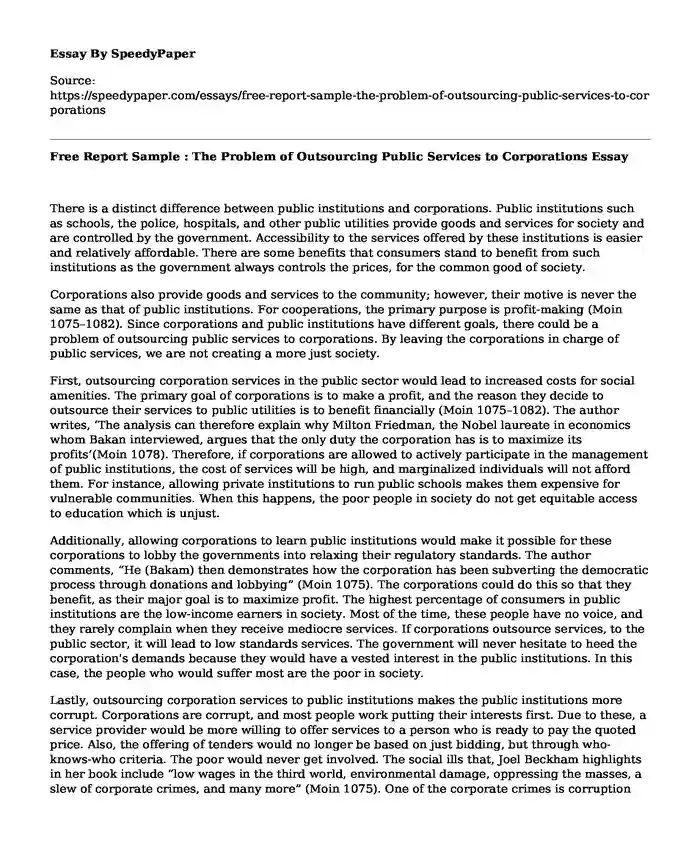
| Type of paper: | Essay |
| Categories: | Government Society Community |
| Pages: | 3 |
| Wordcount: | 686 words |
There is a distinct difference between public institutions and corporations. Public institutions such as schools, the police, hospitals, and other public utilities provide goods and services for society and are controlled by the government. Accessibility to the services offered by these institutions is easier and relatively affordable. There are some benefits that consumers stand to benefit from such institutions as the government always controls the prices, for the common good of society.
Corporations also provide goods and services to the community; however, their motive is never the same as that of public institutions. For cooperations, the primary purpose is profit-making (Moin 1075–1082). Since corporations and public institutions have different goals, there could be a problem of outsourcing public services to corporations. By leaving the corporations in charge of public services, we are not creating a more just society.
First, outsourcing corporation services in the public sector would lead to increased costs for social amenities. The primary goal of corporations is to make a profit, and the reason they decide to outsource their services to public utilities is to benefit financially (Moin 1075–1082). The author writes, ‘The analysis can therefore explain why Milton Friedman, the Nobel laureate in economics whom Bakan interviewed, argues that the only duty the corporation has is to maximize its profits’(Moin 1078). Therefore, if corporations are allowed to actively participate in the management of public institutions, the cost of services will be high, and marginalized individuals will not afford them. For instance, allowing private institutions to run public schools makes them expensive for vulnerable communities. When this happens, the poor people in society do not get equitable access to education which is unjust.
Additionally, allowing corporations to learn public institutions would make it possible for these corporations to lobby the governments into relaxing their regulatory standards. The author comments, “He (Bakam) then demonstrates how the corporation has been subverting the democratic process through donations and lobbying” (Moin 1075). The corporations could do this so that they benefit, as their major goal is to maximize profit. The highest percentage of consumers in public institutions are the low-income earners in society. Most of the time, these people have no voice, and they rarely complain when they receive mediocre services. If corporations outsource services, to the public sector, it will lead to low standards services. The government will never hesitate to heed the corporation's demands because they would have a vested interest in the public institutions. In this case, the people who would suffer most are the poor in society.
Lastly, outsourcing corporation services to public institutions makes the public institutions more corrupt. Corporations are corrupt, and most people work putting their interests first. Due to these, a service provider would be more willing to offer services to a person who is ready to pay the quoted price. Also, the offering of tenders would no longer be based on just bidding, but through who-knows-who criteria. The poor would never get involved. The social ills that, Joel Beckham highlights in her book include “low wages in the third world, environmental damage, oppressing the masses, a slew of corporate crimes, and many more” (Moin 1075). One of the corporate crimes is corruption which thrives in this sector. Therefore, if the public outsources their services, the poor would not have access to utilities because they will not be competitive, as they do not have excess money to spare. The corporate world is competitive, as it is governed by profit-making, unlike the public sector. The poor in society will suffer from this.
Conclusion
In conclusion, the corporate world is defined by the survival of the fittest and illumination for the unfit philosophy. If corporations are allowed to run public institutions, they would be in injustice as the poor would suffer. The marginalized will receive mediocre services at a costly price. It will also be impossible for the poor to access the service due to corruption.
Work Cited
Moin A. Yahya. “The Corporation: The Pathological Pursuit of Profit and Power, Joel Bakan (Toronto: Viking Canada, 2004).” Alberta Law Review, vol. 43, no. 4, 2015, pp. 1075–1082., doi:DOI: 10.29173/alr402.
Cite this page
Free Report Sample : The Problem of Outsourcing Public Services to Corporations. (2024, Jan 19). Retrieved from https://speedypaper.net/essays/free-report-sample-the-problem-of-outsourcing-public-services-to-corporations
Request Removal
If you are the original author of this essay and no longer wish to have it published on the SpeedyPaper website, please click below to request its removal:
- Free Essay Example on Gender Dysphoria
- Essay Sample about Community Relations with Police
- Melville Peer Review, Essay Example
- Tax Law and Regulation in Tai-Ga Company, Free Essay for Students
- Free Essay on the Topics of Rape Culture and Feminism
- Essay Sample on Sociology of race and racism
- Essay Sample on Hospitality and Tourism in Singapore
Popular categories




